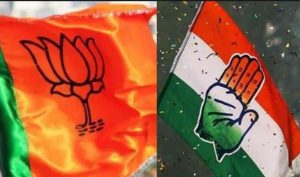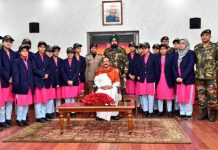 With the polling day of December 7 for electing the 200-member Rajasthan assembly in Rajasthan drawing close, both the BJP and the Congress are not only engaged in hectic flurry of electoral campaigning, but are again raking up issues surrounding religion and cow in a bid to appeal voters. The BJP camp is humming with slogan “Ek hi naara ek hi naam: Jai Shri Ram, Jai Shri Ram” (One slogan, one name…) whereas the Congress has coined the parallel slogan of “Na jaat, na paat, is baar haath” (No caste, no creed, only the hand). Rajasthan is known for having set the precedent of change of government every five years as is discernible from the electoral history of the state for the past three decades.
With the polling day of December 7 for electing the 200-member Rajasthan assembly in Rajasthan drawing close, both the BJP and the Congress are not only engaged in hectic flurry of electoral campaigning, but are again raking up issues surrounding religion and cow in a bid to appeal voters. The BJP camp is humming with slogan “Ek hi naara ek hi naam: Jai Shri Ram, Jai Shri Ram” (One slogan, one name…) whereas the Congress has coined the parallel slogan of “Na jaat, na paat, is baar haath” (No caste, no creed, only the hand). Rajasthan is known for having set the precedent of change of government every five years as is discernible from the electoral history of the state for the past three decades.
BJP’s Stakes
Stakes for the BJP in Rajasthan are very high, especially in view of the fact that it is seeking the mandate once again in the wake of anti-incumbency wave. Undoubtedly, the BJP’s catchphrase – “Bhajapa Phir se” (BJP once again) – has kept the state unit of the party sanguine of its return; nevertheless, the emerging equations on the ground projects a different scenario in which it will be difficult for the party to retain power. In its bid to harness caste and Hindutva factors in its favour, the BJP leadership is depending on its star campaigners like PM Modi, Yogi Adityanath, Rajnath Singh and Amit Shah to tap their core constituencies, along with chief minister Vasundhara Raje focusing her energies on Jats.
The tone and tenor of the campaign by BJP’s star campaigners is characterized by the overemphasis on PM Modi’s achievements, denunciation of Congress and reluctance to seek votes in the name of chief minister, a factor that speaks of BJP’s apprehensions about anti-incumbency. Simmering discontent among various segments of the society – farmers, medium and small traders, Rajputs, students etc., against the incumbent chief minister is worrisome for the BJP. The dissenting voices seeking a change in state leadership are echoing far and wide and one critic has opined: “Most voters are not as angry at the BJP as they are at her” (Vasundhra Raje).
Congress Stratagem
Victory for Congress in Rajasthan is very crucial for Congress in its run for 2019 Lok Sabha. Anti-incumbency wave against the BJP is Congress’s best bet despite its own house in disorder from organizational perspective. If winds of change blowing over the political landscape of Rajasthan become favourable to the Congress, then certainly then it would end party’s prolonged political drought. Congress campaigns are echoing slogans like ‘abki baar, Rajasthan mein Congress sarkar’”.
During his recent visit to various constituencies of Rajasthan this author could see simmering anger and discontent, especially in the rural areas, among various sections against the BJP government, which if properly harnessed could be turned into support for the Congress. Some experts opine that the Congress doesn’t even seem to be trying to set the agenda on the groundand party’s state leadership is hoping on anti-incumbency wave to catapult it into power.
Manifestoes
Lofty promises to lure the electorate of Rajasthan are envisaged in the respective manifestoes released by the BJP and Congress. Congress’s manifesto is titled as ‘Jan Ghoshna Patra”, and the BJP’s manifesto is entitled as Rajasthan Gaurav Sankalp.’ In return of Congress terming BJP’s manifesto, a ‘chhalava-patra’ (document of deceit), the BJP has accused the Congress of “copying” its manifesto. In their endeavor to capitalize on agrarian crisis, both the parties have incorporated key demands of farmers, including waiving of debt, minimum support price, concessions on electricity and water and launching of rural welfare schemes etc.
Allusions to focus on cows, construction of gaushalas (cow-sheds) and gauraksha (cow protection) find place in manifestoes of both the parties along with Congress promise of camel protection as well. Promotion of Sanskrit language and Vedic education has been emphasized by both parties with slight variations in the modus operandi. Providing free education for girls and restarting two universities started earlier by Congress and stalled by present dispensation constitute the hallmark of Congress manifesto. Constituting a regulatory authority for private education institutes and coaching centres has been promised by both the parties.
Issues like promise for reservation for tribal communities, specific measures for women, BJP’s promise of universal health insurance and Congress promise of giving a legal identity to right to health, absorption of contractual workers in the government sector, creating jobs for the youth and stipend to unemployed youth, Congress promise of simplifying GST in the State and BJP’s promise of simplifying regulation of mining industry etc., find echo in the respective manifestoes of both the parties. While the Congress manifesto promises removal of the minimum education eligibility criteria to contest in the Panchayati Raj elections, the BJP manifesto, in order to please the Nath sect in Rajasthan, promises to build a national memorial for him and restore monasteries of the Nath sect.
Opinion Polls
Pre-poll surveys on Rajasthan have articulated mixed predictions, with many opinion polls showing the BJP government on its way out. A Times Now- CNX survey has shown that the Congress is likely to storm to power in Rajasthan with 110 to 120 seats in the 200-member Legislative Assembly, while the BJP, on the other hand, is predicted to wind up getting between 70-80 seats. The survey further reveals that the Congress could bag 43.5% vote share in the state, while the BJP could manage only 40.37%. The BSP is expected to win between one to three seats – repeating its 2013 performance.
Another survey conducted recently by the ABP News-CSDS has predicted a clear lead for Congress in the ensuing polls wherein the Congress is predicted to win 110 seats while the BJP is expected to bag 84 seats. A poll of polls, based on several other surveys conducted for Rajasthan ahead of the December 7 elections, shows the Congress could come to power with 119 seats while the BJP may finish second with 73. The authenticity of these pre-poll surveys will be tested on December 11 when the votes will be taken up for counting.
Way Ahead
The assembly elections in Rajasthan are not an easy cakewalk either for the BJP of Congress. Despite their best foot forward, both the BJP and Congress are faced with the dilemma of rebel candidates, who have been denied ticket in one party have joined the rival party. The Jats, disenchanted with the BJP have either switched their loyalty to Beniwal’s party or to the Congress and the Rajputs disenchanted with the Congress have reportedly gone back to the BJP. The resultant outcome is that both parties are wary of the electoral outcome. According to some analysts, caste is going to be the most decisive factor in the ongoing polls in Rajasthan they further opine that despite ideology, poll philosophy or chemistry playing crucial role in the polls, the only factor that’s going to decide the outcome in Rajasthan this time is caste arithmetic.
Bulk of Rajasthan’s population lives in rural areas and only a quarter of Rajasthan’s households live in urban areas, withfarmers constituting a strong and influential block of voters in the state. Simmering farm discontent in rural Rajasthan is emerging as the biggest challenge for the BJP in its attempt to retain power in the desert state. There is seemingly a general consensus among many experts that the BJP may retain the urban vote, while the Congress will take the rural.
Outcome of this election is significant for both the BJP and Congress, for BJP it is a prestige issue to retain the state and for Congress it is “the most important election” for its revival, a semi-final, before 2019.












